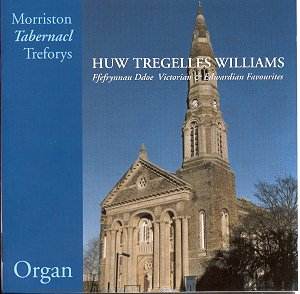In this thoroughly engaging disc Huw Tregelles Williams
revisits some popular classics and manages to add a couple of surprises.
Elgar’s Imperial March broadens from its circumspect opening into idiomatic
amplitude – the arrangement by Sir George Martin, the then organist
of St Paul’s Cathedral, preserves Elgar’s nobility and jaunty confidence
of utterance. Mendelssohn’s final sonata for organ, the sixth, is a
set of variations and fugue on a chorale, composed toward the end of
his life. Reflective and inward its Bachian inspiration is entirely
characteristic of Mendelssohn, whose fugal and contrapuntal writing
is endlessly fascinating. Williams vests the music with a suitable gravity,
managing the transition at 5.46 with skill, and allowing the subsequent
grand statement to emerge with splendid vigour. The fugal passage, beginning
at 8.53, is delineated with care and clarity and the final movement
in D major – quiet and once more reflective - is paced with real understanding.
W T Best’s arrangement of the obscure Morandi’s piece
is a frisky, frivolous and stomping rondo. With its trumpet figuration,
swell box and fanfares it is five minutes of high jinks, never overdone
by Williams, until the two final Herculean chords bring the piece to
a shattering conclusion. Parry’s Fantasia and Fugue in G had a convoluted
history. Sain’s notes are somewhat vague on the matter but according
to Jeremy Dibble’s biography of the composer the work had its origins
in 1877 and 1878 but was shelved and only exhumed by Parry in 1912.
He then replaced the original fugue with a newly composed one. A technically
and expressively difficult piece to bring off – despite its relative
brevity – it is a welcome addition to this disc and adds ballast to
the programme. Parry is followed by his younger British colleague, the
blind organ virtuoso, Alfred Hollins. His Trumpet Minuet doffs its hat,
musically, to Jeremiah Clarke and features the attractive Tromba stop.
There is a sturdy, Beechamesque swagger about it that is immediately
attractive.
The Fantasia on Twrgwyn is a fine and rhetorical piece
based on the hymn tune by the nineteenth century John Edwards of Llangadog.
It opens in grandly dramatic fashion, uncompromising, granite-faced,
allowing some treble runs before restating its higher purpose. The piece
was written featuring prescribed registrations - the Vox Humana and
the Tremulant make their rather extraordinary presence abundantly clear
– and these act as contrastive musical features in this passionate,
almost theatrical work, redolent of the Welsh revivalist preachers,
a point well made in the sleeve notes. Whitlock’s Folk Tune appears
as balm after the thunderous assaults of T.J. Morgan; this is twilit
music. His Scherzo, by contrast, sounds like a transcription of an orchestral
piece – a bouncy staccato with imitative orchestral passages.
And so to Edwin Lemare, without whom a disc of this
kind could not be complete. The Andantino in D Flat makes its potted-palm-and-hat-box
appearance to good effect; a million seller in its day Williams notes
that in the second appearance of Lemare’s immortal melody the organist
has to play on two manuals simultaneously with one hand, using the thumb
only on the second manual. Finally the Suppé, which reflects
an era of orchestral transcriptions - on this occasion one by Edwin
Evans, who was an organist as well as being better known as a critic
and writer.
Williams has written the sleeve notes; the sound is
good but no track timings are given and no individual movements are
separately tracked.
Jonathan Woolf

![]() Huw Tregelles Williams,
organ
Huw Tregelles Williams,
organ ![]() SAIN SCD 2260 [67.29]
SAIN SCD 2260 [67.29]